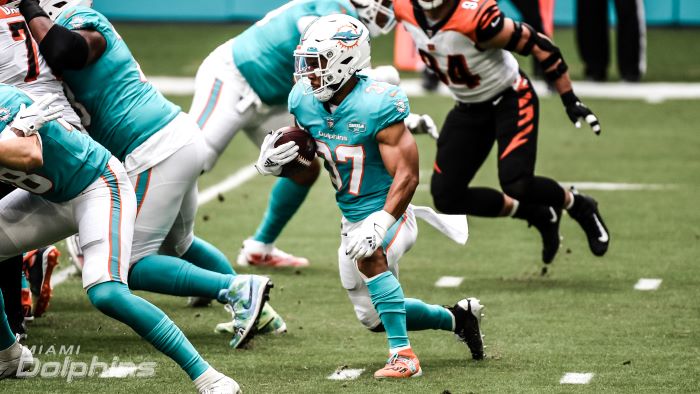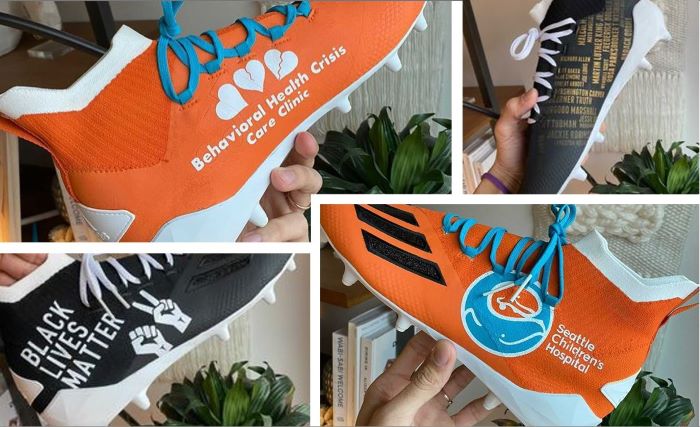
During the month of December, NFL players sport a different look on their feet with custom designed cleats aimed to represent a cause that they feel most passionate about.
It was only natural for Myles Gaskin, former University of Washington (UW) Huskies football player, now running back with the Miami Dolphins, to choose a cause that hits close to home in more ways than one.
“Growing up in Seattle, I always knew about Seattle Children’s, so when I was playing for UW, teammates and I decided to visit the hospital a few different times to meet some the kids,” said Gaskin. “The whole experience really opened my eyes to see how much you can impact someone by just giving them your time.”
With Seattle Children’s in mind for his cause, Gaskin wanted to zero in on another issue that deeply spoke to him.
“My former teammate from UW, Race Porter, and I have a clothing brand centered around mental health called HOMS (Heart on My Sleeve),” Gaskin said. “The clothing brand was started by Race as a way to cope with his mental health challenges.”
Gaskin witnessed firsthand his closest friend going through difficult times, which was something that affected him too.
“Seeing him down, I wanted to help, but I didn’t know how,” Gaskin said. “I knew that all I could do was talk to him and listen. Through my cleats, I want to keep that conversation of mental health going and want people to know that people are out there for them.”
Inspired by both Seattle Children’s and mental health, Gaskin decided to go with Seattle Children’s Behavioral Health Crisis Care Clinic (BHCCC) as one of the causes to sport on his cleats.
Caring in crisis

The Seattle Children’s Behavioral Health Crisis Care Clinic began in spring 2019 after it was designed by Dr. Elizabeth McCauley, associate director of Child and Adolescent Psychiatry and Behavioral Medicine, and Dr. Molly Adrian, clinical psychologist at Seattle Children’s.
“What’s unique about this clinic is that we are working with youth facing suicidal crises and trying to present options other than what is available in their communities,” said Sophie King, operations supervisor for BHCCC. “This helps prevent inpatient hospitalizations by offering a new treatment method.”
This new method focuses on both the youth and their caregiver, with two different clinicians working with them to understand that when there’s a crisis affecting someone, it impacts the whole family. Clinicians make sure the caregivers have the tools and support they need during a crisis.
“We have a full-time case manager, Leah Erickson, who holds families’ hands in the midst of crisis, while helping them navigate the complicated mental health system,” said Dr. Eileen Twohy, clinical psychologist at Seattle Children’s who leads the BHCCC clinical team. “They provide individualized support to families and help them get connected to therapy, which is one of the most challenging things to do.”
Twohy says that often times suicidal crises are short term, therefore, the team at the BHCCC is passionate about giving alternative options for treatment.
“Being suicidal doesn’t mean a child needs to be admitted to the hospital,” Twohy said. “Working with families on communication and capitalizing on the families’ strengths and providing information and education on suicide and prevention, keeps kids in out of hospital and in their homes and communities to give them the support they need to help keep them moving forward.”
Initially funded by an anonymous donor whose family experienced multiple mental health crises, the clinic has seen 138 patients to date.
“There’s a lot of stigma about youth mental health issues and suicidality,” Twohy said. “Seeing such amazing kids and families in our clinic illustrates that a crisis can happen to anybody and it doesn’t need to define your life. Our goal is to get kids back on track and destigmatize these types of issues.”
When the team at the BHCCC found out that Gaskin would be dedicating one of his cleats to the clinic, they were ecstatic.
“Myles choosing us highlights so much about kids’ mental health and breaking down the stigma, and reaching out to others when you need help,” King said. “This is the underlying message we want this clinic promoting, and to have such a public figure representing this cause means more than you could ever know.”
Without the support of people like Gaskin and the community, the clinic wouldn’t be able to treat the many kids that are in need of help.
“Much of what we do in the clinic is supported through donors,” King said. “Therefore, we’re grateful for Myles bringing awareness to the clinic, which will ultimately help us support even more families in crisis down the road.”
Wearing his heart on his cleats
Paired with another cleat that represents the Black Lives Matter movement, Gaskin will be sporting his bright orange Seattle Children’s cleat down on the field this month, reminding kids from all different backgrounds out there that they should open their hearts and minds to talking about mental health.
View this post on Instagram
“When I was younger, I learned that you shouldn’t close yourself off to the world when you’re feeling down,” Gaskin said. “While I was going through my teenage years and trying figuring things out, I would try to find someone to confide in. For me, it was my brother.”
Gaskin encourages kids to talk openly and have a go-to person they can trust with their issues, whether that be a parent, sibling or friend, and know that they aren’t the only one going through what they’re going through.
“It might feel like you versus the world, but just know that there are people who can listen and give you advice,” Gaskin said. “Be open and don’t be afraid to speak up.”
If your child or family needs help right away, call your county’s mental health crisis number. In King County, call 866-427-4747. You can also text HOME to 741741 or call the National Suicide Prevention Lifeline, 800-273-8255, from anywhere in the U.S. If you or a family member has a problem with a substance use disorder, please consider calling the Washington Recovery Help Line, 866-789-1511.
If your child is not in crisis but you need help finding mental health providers in your local area who fit your child’s needs, contact Washington’s Mental Health Referral Service for Children and Teens.
If you want to support the Behavioral Health Crisis Care Clinic, please visit the Donate Now page, choose the “Other” designation and write in the clinic’s name.

